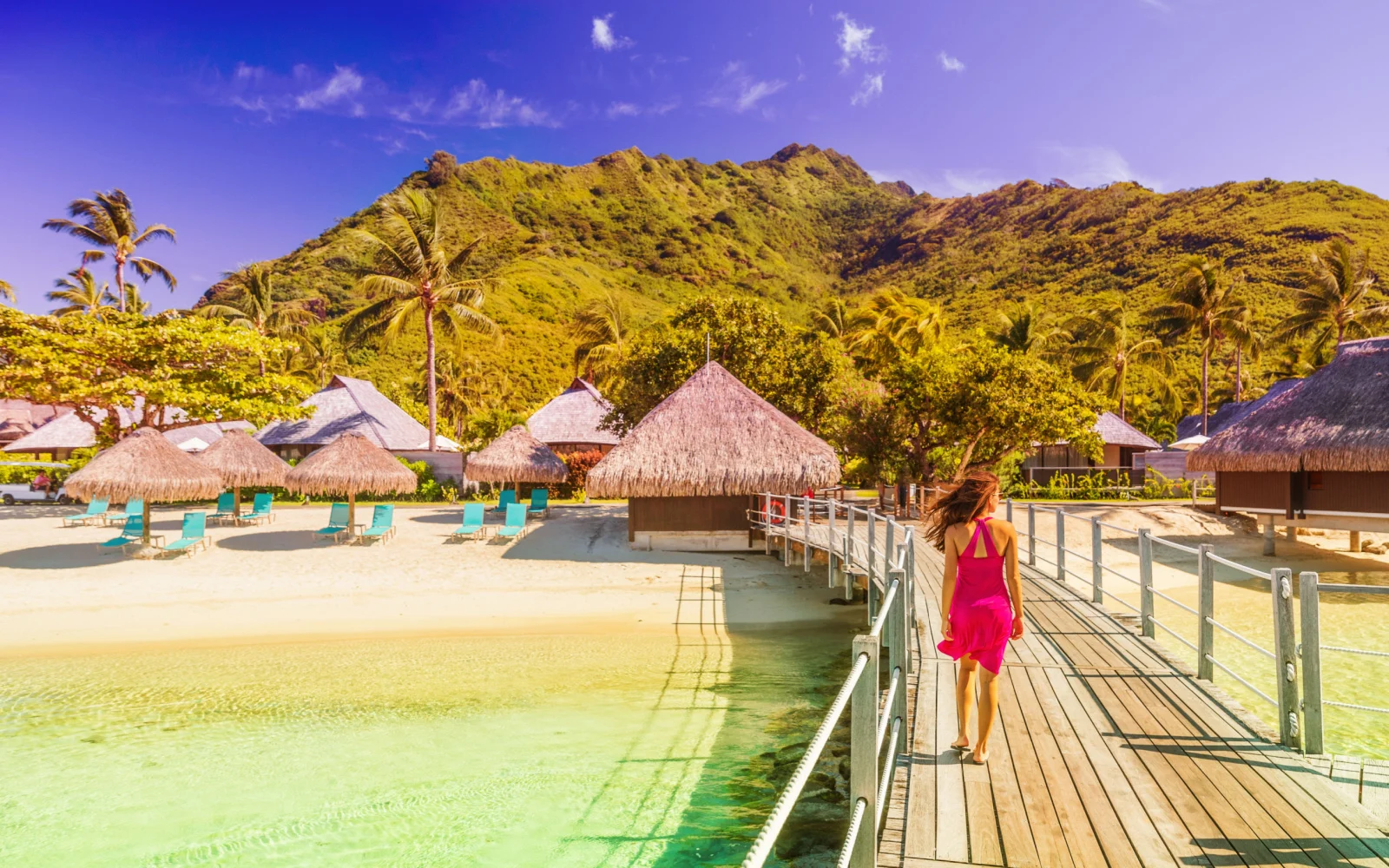Is Tahiti safe to visit?
Yes, Tahiti is safe to visit with a low crime rate (17.38/100 on the crime index). Petty crimes like pickpocketing and theft from vehicles are more common in crowded areas like Papeete, but violent crime is rare. Basic precautions, such as securing valuables and avoiding poorly lit areas, can help ensure a safe trip. Be mindful of potential strikes and weather conditions during the rainy season.
Tahiti, in the beautiful South Pacific ocean, is a dream destination for many people. Tahiti is part of French Polynesia, a French overseas territory that receives about 300,000 visitors per year — more than the local population.
The primary reason people visit Tahiti is for the beautiful beaches such as the surf break Teahupo’o, La Plage de Maui with its famous white sands, and more. You can learn about local culture at the Museum of Tahiti and Her Islands or just by stroll around the capital Papeete and visiting local markets.
Tahiti also has plenty of opportunities for adventure travel, such as hiking to the three waterfalls of Faarumai, surfing, swimming with whales, and even lava tube canyoning!
After reading about all these attractions (and looking at a picture or two), you probably want to hop on the first plane that you can book. But is Tahiti safe to visit? Here’s our expert take.
Is Tahiti Safe to Visit in 2026?
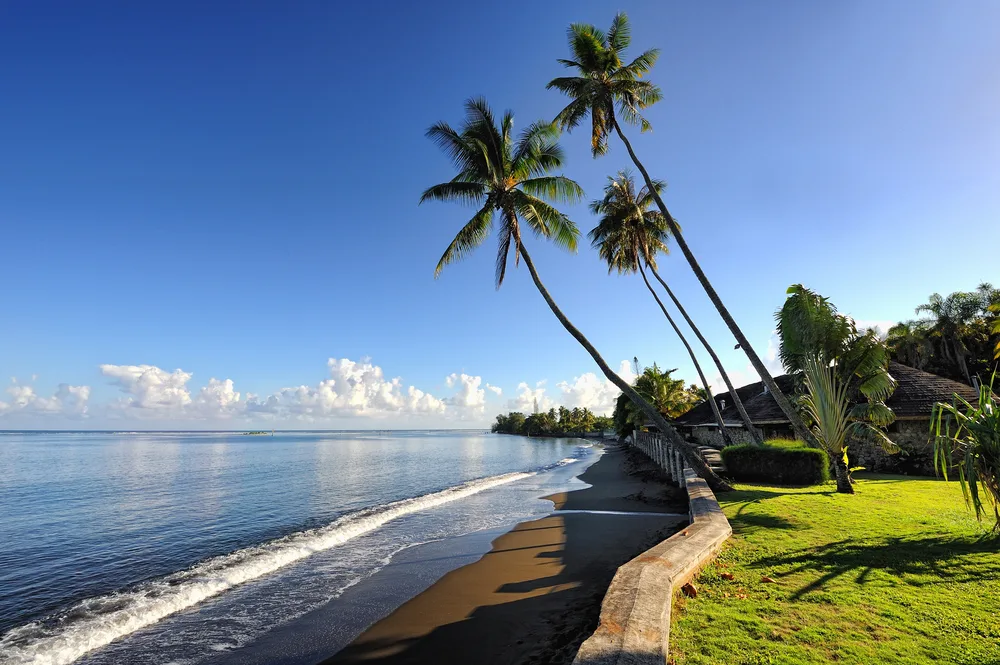
Ppictures/Shutterstock
Yes. Traveling to Tahiti is very safe thanks to the low crime rates and well-developed infrastructure. French Polynesia has one of the lowest crime rates in the world, and even though Tahiti has more crime than other places in the territory, it is still very safe.
Don't waste your hard-earned money. Get the best deal on your trip by finding flight and hotel deals on Expedia.com!
- Options for all travel styles & budgets
- Hotel price match guarantees
- Exclusive last-minute deals
The most you will have to do is take a few basic precautions to protect your valuables. French Polynesia is one of the safest countries in the world for travel.
Most foreign governments don’t bother with extensive travel advisories for it, which can show you how safe it is. The New Zealand government doesn’t issue a specific travel advisory for French Polynesia, besides telling citizens to exercise some precautions.
You might encounter some problems when you travel to Tahiti, such as:
- Pickpocketing
- Bag snatching
- Theft from vehicles
- Drink spiking
- Verbal harassment
Any problems you might encounter in Tahiti are usually petty in nature. Violent crime on the whole island is unheard of. Violent crime affecting tourists is even rarer.
Some travel advisories, such as the one from the Australian government, warn about the risk of civil unrest before traveling to Tahiti.
The island is technically part of France, which means that strikes and demonstrations that are planned in mainland France typically have their outposts in Tahiti. For example, local Tahiti unions joined the general strike against French pension reforms in March 2023.
Follow the local news before your planned trip as most strikes are announced ahead of time. Strikes may affect your ability to get around the island or get to Tahiti at all as transportation unions usually join the strikes.
Most demonstrations in French Polynesia occur in Papeete in Tahiti since it is the capital of the whole territory. If you notice a demonstration while you are in town, avoid venturing nearby as they sometimes turn violent. But it’s not just humans you have to be mindful of..
November to April is the local rainy season, and tropical storms may occur during that time. But full-on cyclones are rare as French Polynesia is outside of the South Pacific cyclone zone. It’s still a good idea to read up on cyclone preparedness before you travel, or to book your trip for the dry season.
Don't waste your hard-earned money. Get the best deal on your trip by finding flight and hotel deals on Expedia.com!
- Options for all travel styles & budgets
- Hotel price match guarantees
- Exclusive last-minute deals
Crime in Tahiti
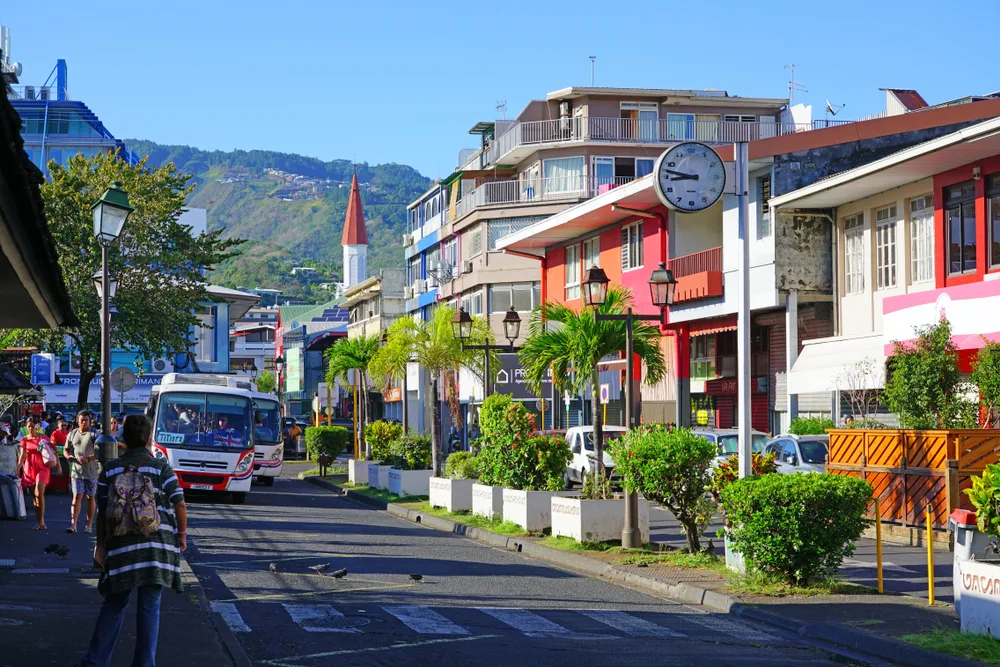
PAPEETE, TAHITI -30 NOV 2018- View of downtown Papeete, Tahiti, the capital of French Polynesia/EQRoy/Shutterstock
Fortunately, your risk of that happening in Tahiti is low as the crime rate is low. Overall, French Polynesia has a very low crime rate. According to Numbeo, the territory scores an 17.38 out of 100 on the crime index, which is a very low value.
Most respondents only reported minor concerns about petty crime, such as thefts from vehicles, vandalism, theft, and drug abuse. The violent crime rate in all of French Polynesia is very low.
According to data from the World Bank, the homicide incidence rate for all of French Polynesia is 0.38 incidents per 100,000 people, or about 1 homicide per year. The rate of other violent crimes is comparatively low.
Tahiti is the place in French Polynesia with the highest crime rate. Tahiti is home to over 189,000 people, or a little less than 70% of the total population of French Polynesia.
It is also home to the biggest town with the densest population, Papeete. It makes sense that most crime incidents would be concentrated where there are the most people. Keep in mind that in French Polynesia, the “highest” crime rate is all relative.
Tahiti may have a higher crime rate than Bora Bora or smaller islands such as Maupiti, but its crime rate is still very low. Most crime incidents occur in Papeete, the capital.
The local government offers a detailed breakdown of crime in Papeete. 54.24% of all crimes committed are non-violent thefts. The most common types of theft are simple thefts and thefts from vehicles such as cars or caravans.
The most common violent crime in Papeete is assault, which makes up 11.57% of total crime in Papeete. Most cases of assault involve hitting or harming someone with criminal intent.
Some incidents of domestic violence are classified as assault, which can explain the high percentage. Overall, the crime rate in Tahiti is much lower than it probably is in your hometown.
You will have to take some precautions when you travel there to protect your valuables, but those are common sense precautions that you are (hopefully) taking wherever you may travel.
Petty Theft
The most common problem you might encounter when traveling to Tahiti is petty theft. According to a US News & World Report travel analysis of Tahiti, you are most at risk in the capital Papeete.
This makes sense since Papeete has the most crowds. In Papeete, crowded areas are hotspots for pickpockets. These areas include the port where cruise ships and ferries dock — whenever a ship comes in, the port is crowded with people, creating the perfect cover for thieves.
Local markets and tourist attractions are also popular theft locations. Thefts increase after dark, so be careful if you are exploring Papeete’s nightlife.
The Canadian government also mentions the risk of petty crime in its travel advisory, along with some advice on how to protect yourself. Always keep your belongings secure, even though you may feel relaxed on such a laid-back island.
Don’t leave valuables such as purses, phones, wallets, and IDs unattended, even when you go swimming — Tahiti’s thieves sometimes rifle through people’s things while they are in the water.
A good way to avoid being the victim of a theft is not to carry around anything that you would be devastated to lose. You should have some form of ID on you at all times, but bring a copy of your passport or driver’s license instead of the original.
Take only the cash that you need for the day. Store extra cash, jewelry, and other valuables in your room safe, which is a fixture in most good hotels.
Theft From Vehicles
Another form of petty crime that you should watch out for in Tahiti is theft from vehicles. Public transportation around Tahiti is present but it is limited to a bus service, so many tourists opt to rent cars or scooters during their stay to see all that Tahiti has to offer.
However, keep in mind that according to local crime statistics, theft from vehicles is the most common form of petty crime. When you rent a vehicle, you are vulnerable to this form of crime.
Luckily, preventing theft in Tahiti involves pretty simple precautions as the criminals are just as laid-back as most of the other locals. If you rent a car, just make sure that you lock your doors and roll up your windows when you park.
Many locals and visitors get so taken in by the laid-back atmosphere that they forget to take even this most basic precaution, making them vulnerable to theft.
Another precaution you should take is not to leave valuables in your vehicle, especially not where they are visible. Try to take your most expensive items with you whenever you leave your car, and definitely don’t leave a new camera or tablet lying out on the seat.
Most scooters that you rent will have a storage area in the back. However, these bins rarely have good locking systems. You can leave some things there, but don’t store valuable items there as they might get stolen.
Avoiding Bad Areas
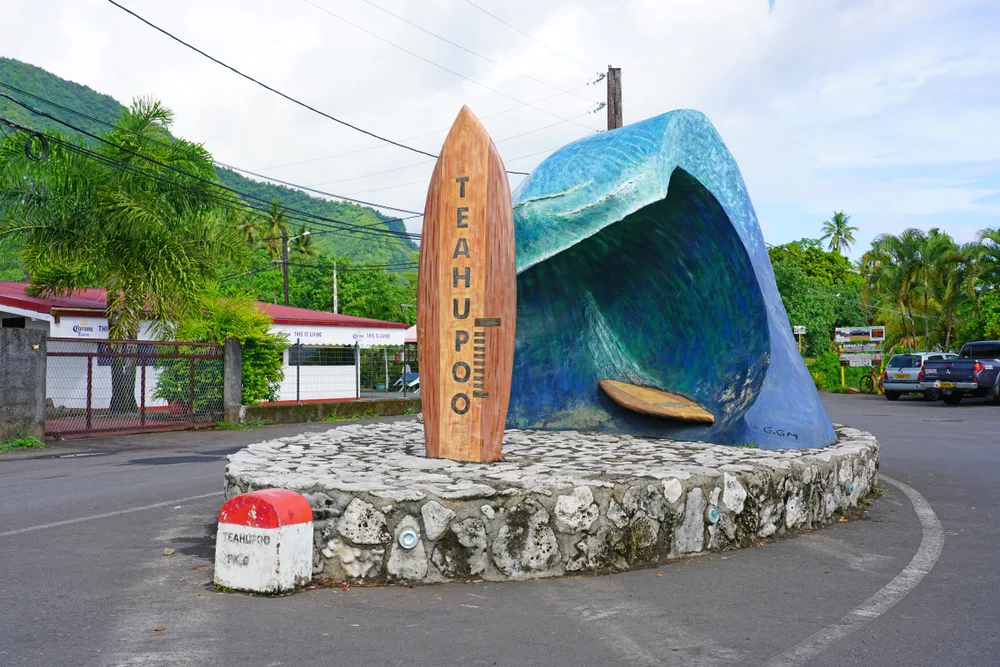
TEAHUPOO, FRENCH POLYNESIA -11 DEC 2018- View of Teahupo’o on the south-east coast of the island of Tahiti, French Polynesia. Its black sand beach is famous for its surf and surfing competitions/EQRoy/Shutterstock
There are no bad areas on Tahiti, but there are some areas where you should exercise a bit more caution. Theft and other petty crime is most common in the capital Papeete.
Make sure you keep a good grasp on your bag as you move around town, especially in crowded areas. The main streets with bars and clubs can get rowdy at night, so be careful, especially if you are a woman.
Some beaches on Tahiti are a bit dangerous. Teahupo’o has massive waves and breaks, so only go if you are an experienced surfer — newbies should just watch from the sides.
Things to Consider
Here are a few additional safety tips to consider when traveling to Tahiti:
- Medical facilities in Tahiti are moderately good. Papeete also has the only decompression facility in French Polynesia, so if you are planning on going scuba diving, Tahiti is a better choice than more remote islands. Make sure your travel insurance covers medical evacuations as for more complex problems, you may have to be transported to New Zealand.
- Practice beach safety in Tahiti. Ask locals about which beaches are safe to go to, as most don’t have lifeguards. Some beaches have strong currents and riptides, especially during the rainy season. Keep your own skill levels in mind.
- Be careful around local wildlife. Wear beach shoes to avoid stepping on coral or stonefish. Coral cuts can get infected, and stonefish are poisonous. Sharks are common in Tahiti, but they are mostly laid-back and don’t attack humans. Don’t wear shiny objects in the water that might attract them. If you see a shark, swim calmly away.
- If you go on an adventure tour, choose your tour operator carefully. Make sure that they meet international safety standards.
Frequently Asked Questions
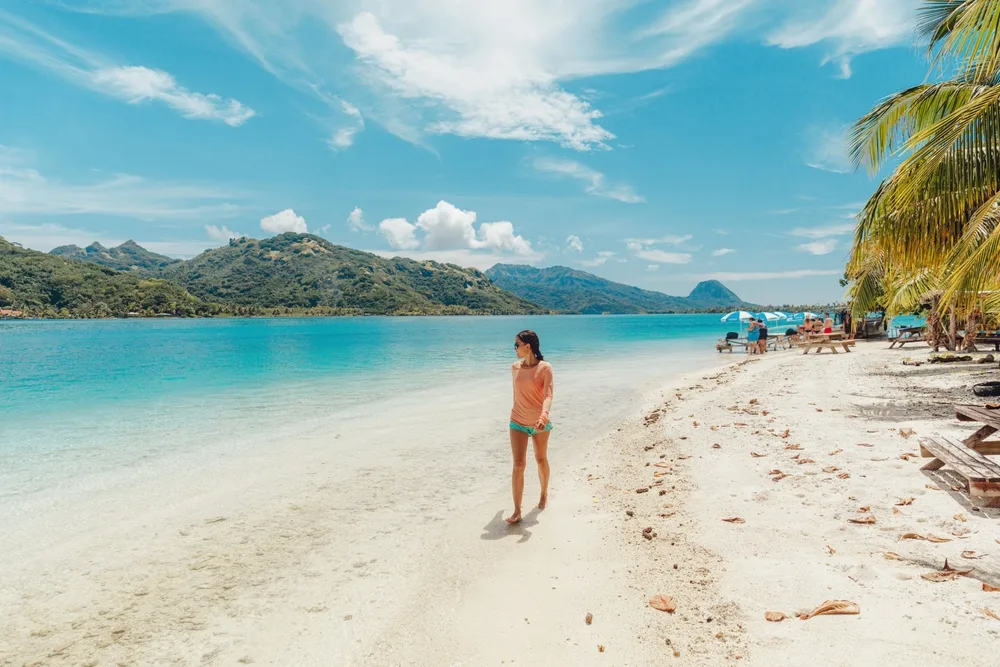
Maridav/Shutterstock
Here are some common questions you might want to ask before visiting Tahiti:
Is Tahiti safe to walk around?
Yes, Tahiti is very safe to walk around. Women may want to be careful after dark on remote beaches and around party areas of Papeete, but for the most part, a scroll after sunset is safe on the island.
Is it safe to go to Tahiti?
Yes, it is very safe to go to Tahiti. The risk of danger from both natural disasters and local criminals is very low.
What should I be careful of in Tahiti?
In Tahiti, be careful of things that might hurt your health. Tap water is usually unsafe to drink outside of the capital of Papeete. Be careful that your food is properly cooked as people have gotten sick from undercooked meat before. It’s always good to have comprehensive travel insurance just in case.
Are Tahiti and Bora Bora safe?
Both Tahiti and Bora Bora are very safe. Bora Bora is a bit safer as it has a lower crime rate, but even Tahiti is very safe for visitors.
Is Tahiti at risk of tsunami?
Tsunamis in Tahiti are very rare. There have only been 13 in the past 150 years, usually due to seismic events elsewhere in the Pacific. Other natural disasters such as tropical storms are more common.
Don't waste your hard-earned money. Get the best deal on your trip by finding flight and hotel deals on Expedia.com!
- Options for all travel styles & budgets
- Hotel price match guarantees
- Exclusive last-minute deals
Book Your Trip to Tahiti Today!
Tahiti is one of the safest places you could visit in the world. It has a very low crime rate and a welcoming atmosphere. It’s no wonder that for most visitors to Tahiti, the trip is one they remember forever. So what are you waiting for — book your trip today!



